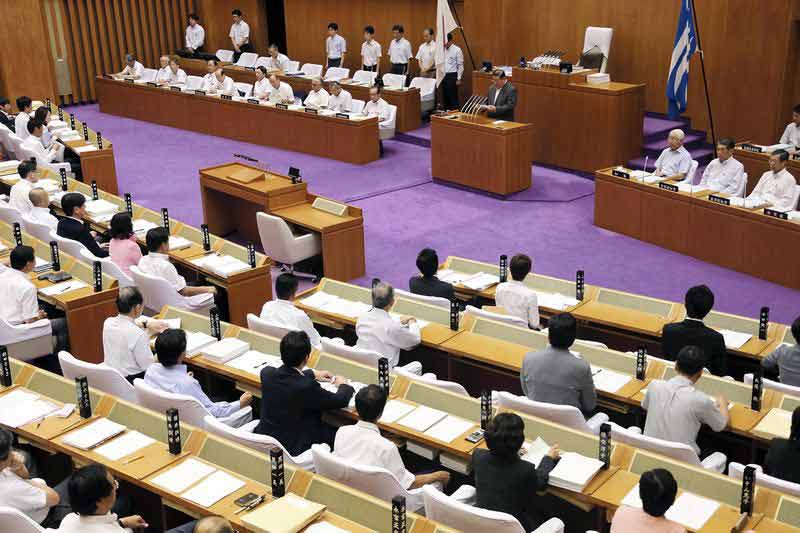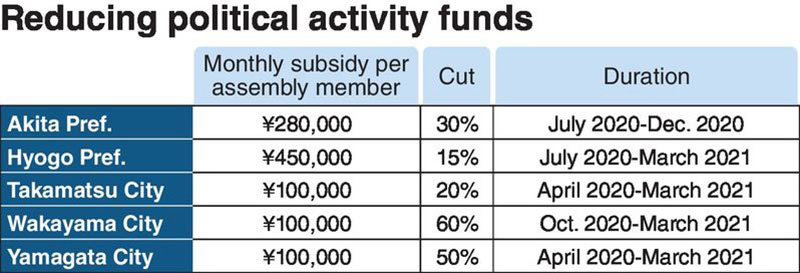
The Hyogo prefectural assembly holds a meeting in September 2014.
November 27, 2012
The pandemic has affected the amount of subsidies allocated to local assembly members for political activities and how these funds are used.
Separately from remuneration, local assembly members as well as political factions receive these subsidies from their relevant government for policy research and study. The money can be spent on books and training programs, but not for election campaigns or political party activities.
Of 98 assemblies in prefectures and major cities across the nation surveyed by The Yomiuri Shimbun, subsidies for political activities were cut in 19 of them in fiscal 2020, which ended this past March, with the funds diverted to COVID-19 control measures.
On top of this, the budget execution rate, which measures actual spending versus the amount provided, fell in 47 assemblies.

Compared to the previous fiscal year, the funds have been spent less on tours of inspection and on-the-job training and more on publicity-related activities.
Buying disinfection robot
The Yomiuri Shimbun interviewed the secretariats of assemblies in 98 local governments, including prefectural governments, designated cities and prefectural capitals, and checked the publicly available financial statements.
The 19 assemblies that cut subsidies to fund COVID-19 control measures included those in Mie Prefecture, the Shiga capital Otsu and Kagawa capital Takamatsu. Most of them cut the subsidy for a period of at least five months, with the Wakayama city assembly making the biggest reduction of 60% to its usual ¥100,000 monthly grant.
Assemblies including those in Akita City and the Gunma capital Maebashi have continued to cut the subsidy in fiscal 2021. The Sakai city assembly, which paid ¥300,000 a month in fiscal 2020, will cut the amount by 5% in fiscal 2021 and 2022.
The Hyogo prefectural assembly, which pays ¥450,000 a month, has held meetings on coronavirus infections since April 2020, discussing what the assembly could do to cope with a surge of infections. It then implemented a 15% cut of the subsidy for nine months from July 2020 and reduced term-end allowances by 15% in June 2020 to free up ¥100 million. The money was spent on an indoor disinfecting robot for a prefectural hospital.
As for the budget execution rate, it was lower in 47 assemblies compared to fiscal 2019 rates. The assembly of the Shimane capital Matsue agreed to reduce expenditures to less than half of what was provided, dropping the fiscal 2020 rate to 29.4%, or about one-third the fiscal 2019 figure.
Five assemblies, including those in Akita Prefecture and the Mie capital Tsu, lowered the amount of subsidies by 20-45% while also reducing their actual spending.
With unused funds returning to the local government, many assemblies seem to have tried to not spend the money so that their government can secure financial resources for COVID-19 control.
‘Back to basics’
The pandemic has also changed how the subsidy for political activities is used.
Of the 51 assemblies that break down the spending into categories, research costs such as for tours of inspection fell in 49 of them, largely due to travel restrictions amid the pandemic.
In the Tottori city assembly, research expenditures, which had accounted for 39.5% of total political activity expenditures in fiscal 2019, dropped sharply to 1.8% in fiscal 2020. In 2019, Kaiha Shinsei, a political faction of some city assemblymen, dispatched its 12 members to Sendai and Yokote, Akita Prefecture, for two nights and three days to study transportation methods and city planning. The tour cost about ¥1.1 million, making up a large portion of the about ¥2.17 million the group reported for its research expenditures in fiscal 2019. However, there were no research expenditures in fiscal 2020.
“We went back to our basics, thinking how to convey to residents the current state of our activities amid the pandemic, when physical trips cannot take place,” said Kaiha Shinsei leader Eiichi Uesugi. “Instead, we started to publish newspaper inserts and newsletters for each household.”
As a result, the assembly’s spending on publicity rose from about ¥160,000 in fiscal 2019 to about ¥1.14 million in fiscal 2020.
Spending on publicity rose in 49 of the assemblies surveyed.
For the assembly of the Yamanashi capital Kofu, 47.2% of total expenditures on political activities was spent on publicity in fiscal 2020, more than double the 22% in fiscal 2019. The assembly’s Kofu Mirai faction did not have enough budget in fiscal 2019 for its newsletters, managing to only print 40,000 copies, not enough to cover all households in the city. In fiscal 2020, however, it reallocated the funds usually used for activities such as tours of inspection to publicity, printing 61,000 newsletters.
“Residents tell us they look at the newsletter, so it helped them get to know what we are doing,” said Shuichi Hirose, then head of the faction.
Expenditures have also risen for purchasing books and browsing premium databases in 37 assemblies.
For the assembly of the Iwate capital Morioka, this spending made up 19.4% of total expenditures of the subsidy in fiscal 2020, up from 8.4% in fiscal 2019.
Morioka assembly member Tetsuya Toyomura spent ¥290,000 on buying materials out of the ¥600,000 granted annually.
“It was difficult to gather information without going anywhere, but I learned about the novel coronavirus through books and the internet, and made use of the knowledge to come up with questions at assembly meetings,” he said.
Kazuhiro Taguchi, an associate professor at the University of Niigata Prefecture who specializes in parliamentary studies, said the pandemic has changed the way local assembly members work.
“Tours of inspection for policy making and petitions and requests to the central government are necessary jobs for assembly members,” Taguchi said. “On the other hand, they can save transportation fees by switching on-the-job training from in-person to online. The pandemic may be a turning point for new forms of political activities.”
Top Articles in Society
-

Producer Behind Pop Group XG Arrested for Cocaine Possession
-

Man Infected with Measles Reportedly Dined at Restaurant in Tokyo Station
-

Man Infected with Measles May Have Come in Contact with Many People in Tokyo, Went to Store, Restaurant Around When Symptoms Emerged
-

Woman with Measles Visited Hospital in Tokyo Multiple Times Before Being Diagnosed with Disease
-

Australian Woman Dies After Mishap on Ski Lift in Nagano Prefecture
JN ACCESS RANKING
-

Producer Behind Pop Group XG Arrested for Cocaine Possession
-

Japan PM Takaichi’s Cabinet Resigns en Masse
-

Japan Institute to Use Domestic Commercial Optical Lattice Clock to Set Japan Standard Time
-

Israeli Ambassador to Japan Speaks about Japan’s Role in the Reconstruction of Gaza
-

Man Infected with Measles Reportedly Dined at Restaurant in Tokyo Station





















